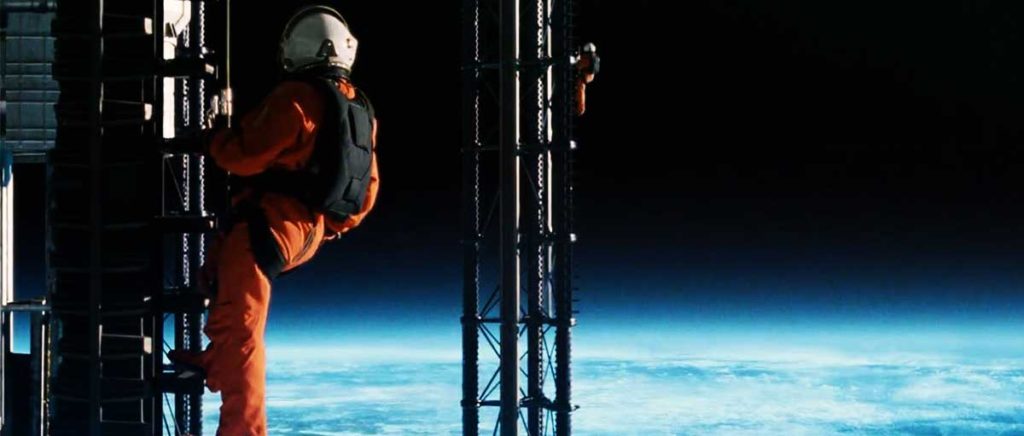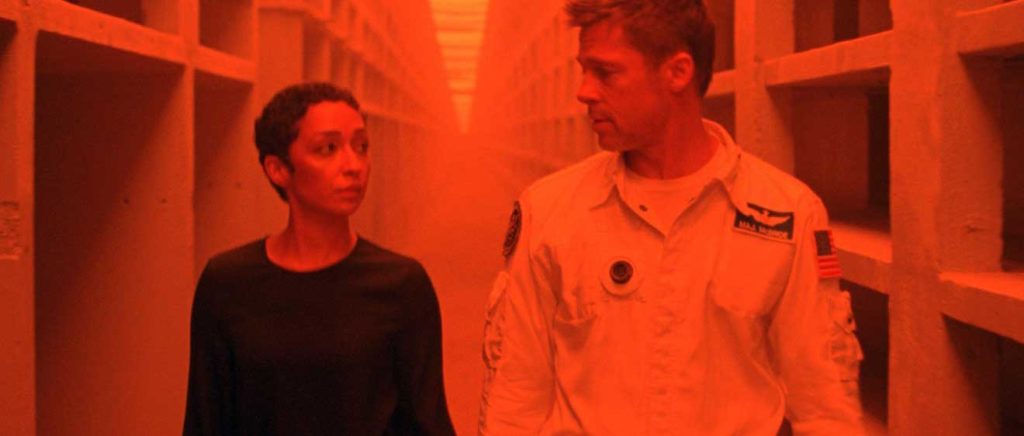
Director: James Gray
Writers: James Gray, Ethan Gross
Cast: Brad Pitt, Tommy Lee Jones, Donald Sutherland, Ruth Negga, Liv Tyler
Producers: Dede Gardner, James Gray, Anthony Katagas, Jeremy Kleiner, Arnon Milchan, Yariv Milchan, Brad Pitt
Music: Max Richter
Cinematographer: Hoyte van Hoytema
Editors: John Axelrad, Lee Haugen
Cert: 12
Running time: 122mins
Year: 2019


What’s the story: Astronaut Roy McBride (Pitt) must journey across the solar system to find his long-thought dead father (Jones), whose mission may now be threatening Earth.
What’s the verdict: Dad Astra might have been a more appropriate title for James Gray’s visually breathtaking space opera. Latin for “To the Stars”, the title is typically used in the phrase “Ad Astra per Aspera”, meaning “To the stars through difficulties”.
Difficulties aplenty beset Brad Pitt’s astronaut Roy McBride, the biggest of which are galactic daddy issues, director Gray thematically picking up where his last film, The Lost City of Z, left off.
The father figure here is Tommy Lee Jones’ near-mythical Clifford McBride. A brilliant scientist long thought dead after a deep space search for alien life seemed to end in tragedy, new evidence suggests McBride Snr is alive and maybe involved in catastrophic galactic storms battering Earth.
Cucumber cool Roy (it’s remarked his pulse never rises above 80) is tasked by military command to make the perilous journey across the solar system and intercept his dad’s space craft, currently near Neptune. But, what awaits the emotionally sealed-off Roy so far from home?

James Gray devised Ad Astra around 2011, but shelved the project when Christopher Nolan told him of plans for Interstellar. Gray also jettisoned his original idea for a church organ-based score upon hearing Hans Zimmer’s work for Nolan’s movie, favouring instead minimalist compositions from Max Richter. He does however retain that film’s cinematographer, Hoyte van Hoytema, to provide similarly Kubrickian imagery.
If Interstellar and 2001 inform the visuals, Apocalypse Now’s fevered DNA can be traced in the plot. Military top brass briefing Roy on the need to intercept and end Clifford’s command is almost beat-for-beat identical to the analogous scene in Coppola’s Vietnam spectacle. And as Roy travels further away from the sun on a ship with a bemused crew, he too approaches a literal heart of darkness.
2001 meets Apocalypse Now may give casual moviegoers the jitters, but the most surprising aspect of Ad Astra is how accessible Gray keeps the story, despite tackling grand, cosmic themes.
Set at an undefined point in the near future, this presents plausible technological leaps (a vast International Space Antenna reaching up into the stratosphere) and depressingly believable stumbles (international tensions over lunar resources, corporate colonisation of the heavens, overpriced add-ons during your rocket flight).
Gray weaves disaster movie fireworks into the story – a disastrous explosion aboard that antenna, a lunar buggy chase with murderous pirates, a rescue mission aboard a ship holding unwelcoming guests – into the swift two-hour runtime. Making Ad Astra more thrilling than most franchise blockbusters.
The breadth of the film’s ambition, journeying from Earth to the Moon then to Mars and Neptune, is again well-realised. No-one will leave saying they haven’t been on an adventure.

Where Ad Astra stumbles is in adding anything deeper to its daddy relationships than we witnessed between Liv Tyler (here in a glorified cameo as Roy’s wife) and Bruce Willis in Armageddon. Meanwhile, existential ruminations on alien life were explored more compellingly in Robert Zemeckis’ Contact twenty plus years ago.
Pitt’s voiceover attempts to vocalise how even the most brilliant person with the stars as his ocean remains empty if without emotional bonds. But, as 2001 proved, it pays to leave the audience pondering for themselves, and we’d like to see Gray do a Blade Runner and release a version sans Pitt’s somnambulant internal monologuing.
But, as a movie star presence Pitt can command a film even as epically mounted as this. Able support is provided by Donald Sutherland as a mission consultant and a menacing Tommy Lee Jones (both of whom made a rather different celestial journey long ago in Space Cowboys), plus Ruth Negga as a Mars outpost commander sympathetic to Roy’s need to reach his dad.
The mind meat may not be as generous as you would have supposed from the trailers, but Gray should continue with these unusual adventure stories. And resist the call of the Marvel franchise machine.
Rob Daniel
Twitter: rob_a_Daniel
iTunes Podcast: The Electric Shadows Podcast

Pingback: Reviews: Ad Astra (2019) | Online Film Critics Society